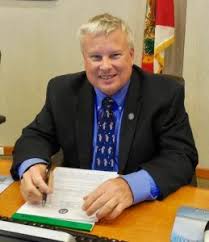Dale Martin
City Manager
Fernandina Beach
April 6, 2018 12:00 a.m.

In January, the City Commission gathered to discuss and determine goals at it annual visioning session. The meeting, conducted at the City Golf Course, was also attended by department directors, several residents, and local media representatives.
The day began with a completely blank slate. City Commissioners were encouraged to offer any topic of interest for discussion, although the discussion would occur only after the list of issues had been completed.
The issues raised were widely diverse: the Marina, downtown density, beach issues (parking, dogs, cleaning), residential density (downtown, 8th Street), environmental issues (conservation, sustainability, dunes), affordable housing, fire services, noise ordinance, the waterfront (specifically, the Amelia River waterfront), the Main Street program, variances, the railroad, enterprise funds, personnel, the Post Office facility, public communication, accessory dwelling units, flood rating, project management, leadership, Comprehensive Plan, annexation, parking, and sidewalks.
After populating the list of issues, the Commissioners were encouraged to discuss their interest and desire for consideration of those issues. Some issues were of a broad interest, generating comments from all Commissioners; others were more limited in interest, with fewer supporting comments.
Following the discussions, the Commissioners were requested to rank their priorities. The Commissioners were provided “scorecards” with values of 10, 7, 5, 3, and 1 on which to record and rank the issues of their interest and concern. The scores were then tallied to determine the issues of greatest interest.
It was no surprise that the river waterfront and Marina secured the most points (30). The downtown waterfront has been a vexing issue for this community for decades. So many different opinions and visions, so many elections and egos have stifled the development of this key community asset.
The next highest scores, which due to their value obviously required more than a single Commissioner’s ‘10’ ranking, were allocated to project management (21) and conservation (18). The only remaining double-digit scores were density (10), beach parking (10), and leashes (dogs) on beach (10). The prioritized issues were completed with seven other topics flood rating, centralized fire station, annexation, sidewalks/lighting, sustainability, personnel, and planning.
What subsequently becomes challenging is building specific objectives related to those thirteen goals. The overwhelming priority was the waterfront, but the “waterfront” does not convey the diversity of specific issues or interests as envisioned by five diverse City Commissioners. A Commissioner may see the “waterfront” as a specifically defined area or function (the parking lots, the Marina) whereas another Commission may consider the “waterfront” more broadly, stretching further north, east, and south than the water’s edge.
The other issues are similarly vague. From discussions with Commissioners, “conservation” encompasses a variety of topics: land acquisition and protections, ecotourism, tree ordinances, personnel, funding, wetlands. Different Commissioners have different ideas.
And that, for the most part, is a very good thing- we are not a monolithic, homogeneous community. But this “herd of cats” (the City Commissioners) that represent approximately 12,000 residents (and even more when you include everyone else that thinks they live within the city limits) has to provide some direction for which resources- time, money, staff- can be appropriately allocated.
City Commissioner goals and interests are not necessarily aligned with City Commission goals. Without fail, the individual goals and the collective goals are well-intentioned and seek the betterment of the community, but it is simply not possible to have five different sets of goals and priorities. The goals need to be further defined and the scope of those goals narrowed to actionable objectives. Not all five need to agree (however, that’s always good), but at least three need to determine and direct.
The City Commission will meet again to provide this definition at a workshop on April 24 (4:00 PM, City Hall). The intent is to acknowledge the Commission’s direction and move forward immediately on those issues that can be immediately addressed with staff and budgetary considerations, or, if resources are constrained, prepare for other issues as part of the impending budget process for next year.
Please share your comments with the City Commissioners as part of this critically important process.
